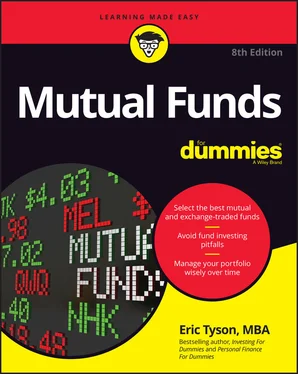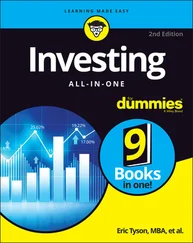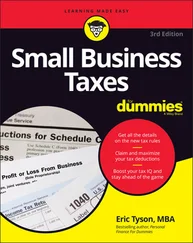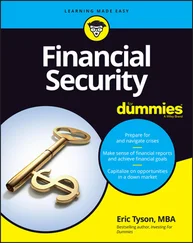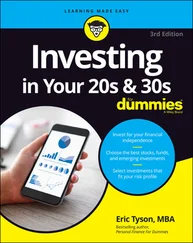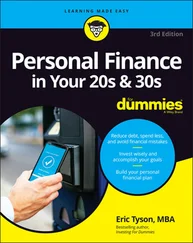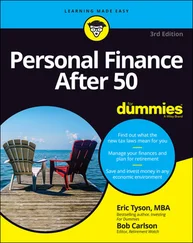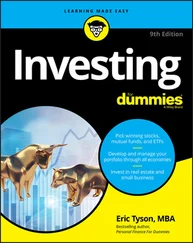Eric Tyson - Mutual Funds For Dummies
Здесь есть возможность читать онлайн «Eric Tyson - Mutual Funds For Dummies» — ознакомительный отрывок электронной книги совершенно бесплатно, а после прочтения отрывка купить полную версию. В некоторых случаях можно слушать аудио, скачать через торрент в формате fb2 и присутствует краткое содержание. Жанр: unrecognised, на английском языке. Описание произведения, (предисловие) а так же отзывы посетителей доступны на портале библиотеки ЛибКат.
- Название:Mutual Funds For Dummies
- Автор:
- Жанр:
- Год:неизвестен
- ISBN:нет данных
- Рейтинг книги:3 / 5. Голосов: 1
-
Избранное:Добавить в избранное
- Отзывы:
-
Ваша оценка:
- 60
- 1
- 2
- 3
- 4
- 5
Mutual Funds For Dummies: краткое содержание, описание и аннотация
Предлагаем к чтению аннотацию, описание, краткое содержание или предисловие (зависит от того, что написал сам автор книги «Mutual Funds For Dummies»). Если вы не нашли необходимую информацию о книге — напишите в комментариях, мы постараемся отыскать её.
Mutual Funds For Dummies
Mutual Funds For Dummies
Mutual Funds For Dummies — читать онлайн ознакомительный отрывок
Ниже представлен текст книги, разбитый по страницам. Система сохранения места последней прочитанной страницы, позволяет с удобством читать онлайн бесплатно книгу «Mutual Funds For Dummies», без необходимости каждый раз заново искать на чём Вы остановились. Поставьте закладку, и сможете в любой момент перейти на страницу, на которой закончили чтение.
Интервал:
Закладка:
Using mutual funds for college expenses
To keep up with or stay ahead of college price increases (which are rising faster than overall inflation), you must invest for growth. At the same time, you have to keep an eye on your time horizon; kids grow up fast (see the section “ Reaching Your Goals with Funds,” earlier in the chapter).
 The younger your child is, the more years you have before you need to tap the money and, therefore, the greater the risk. A simple rule: Take a number between 30 (if you’re aggressive) and 50 (if you’re more conservative) and add that to your child’s age. Got that number? That’s the percentage you should put in bonds; the rest should go into stocks. Be sure to continually adjust the mix as your child gets older.
The younger your child is, the more years you have before you need to tap the money and, therefore, the greater the risk. A simple rule: Take a number between 30 (if you’re aggressive) and 50 (if you’re more conservative) and add that to your child’s age. Got that number? That’s the percentage you should put in bonds; the rest should go into stocks. Be sure to continually adjust the mix as your child gets older.
For a list of good stock and bond funds to invest in, see Chapters 12and 13. Pay particular attention to hybrid funds, which invest in both stocks and bonds and may already reflect your desired mix. If you want to find out more about getting your finances in order and planning for college costs, read the latest edition of my book Personal Finance For Dummies (Wiley).
Part 2
Evaluating Alternatives to Funds
IN THIS PART …
Compare picking your own stocks and bonds to fund investing.
Understand exchange-traded funds and other fund wannabes.
Examine high-cost hedge funds, wrap accounts, and private money managers.
Chapter 4
Selecting Your Own Stocks and Bonds
IN THIS CHAPTER
 Understanding the pros and cons of being your own investment manager
Understanding the pros and cons of being your own investment manager
 Exploring how to pick your own stocks and bonds
Exploring how to pick your own stocks and bonds
Investing in stocks and bonds via mutual and exchange-traded funds is one of several ways to tap in to stocks and bonds. Some investors believe that they don’t need funds and that they should directly invest in stocks and bonds.
Picking your own stocks and bonds is often much riskier, more time consuming, and more stressful than relying on funds. This chapter discusses why people choose their own stocks and bonds and what you need to do to succeed with that if you decide to go that route.
Deciding to Choose Your Own Stocks and Bonds
According to numerous blogs, social media postings, books, newsletters, websites, and articles, mutual funds are not the place to be. They’re boring, conservative, and prone to mediocre returns. According to the pronouncements of these gurus, you can get rich quick by investing in individual stocks.
Social media platforms and blogs have been a tremendous source for misleading hype and outright fraud in recent years. Scores of self-anointed gurus and stock-picking experts claim ridiculously hyped and falsified returns, and unfortunately, many of them evade regulatory scrutiny or punishment. I’ve been quite disappointed by the large volume of obvious hype online, especially on social media platforms where I try to minimize my time because I find them to be incredible time wasters and kinda depressing.
Here are some common threads I’ve observed over time among stock pickers online you should sidestep and avoid:
They rarely or never post their suggested stock trades in advance. They tell you after the fact about stocks they claim to have previously bought.
They report their own calculated super-high returns and don’t have an outside or independent audit to substantiate their high and inflated claims.
They delete postings that make them look bad.
Numerous pundits say that investing in individual stocks provides Himalayan returns, as evidenced by the following examples:
“How we beat the stock market — and how you can, too. 23.4 percent annual return.” — subtitle of The Beardstown Ladies’ Common-Sense Investment Guide
“Forget bonds … real estate … build a portfolio entirely of stocks. Returns an annual average of 34 percent.” — Matt Seto, 17 years old, The Whiz Kid of Wall Street’s Investment Guide
“I have been able to obtain fantastic returns on so many stock market plays: 260,000 percent annualized one-hour returns; 10,680 percent annualized in two days and so many more…. These trades are sort of like a magic trick. At first it seems ‘stupendous’ — otherworldly. But as you learn the trick, you say, ‘It’s a piece of cake.’” — Wade Cook, Stock Market Miracles
Do the stock specialists’ claims sound too good to be true? Well, they are.
Beware the claims of stock-picking gurus
It’s easy to dismiss the outrageousness of the claims made by someone like Wade Cook in the previous section. Even if you don’t know that Cook was for many years in trouble with securities regulators and the courts (and served some serious prison time), your common sense tells you that five- and six-digit returns are well outside the realm of reasonable expectations for stock performance.
REGULATORS WEIGH IN REGARDING INVESTING RULE BREAKERS
The U.S. Securities and Exchange Commission has an admittedly challenging job. As it’s Chair Gary Gensler said at the Securities Enforcement Forum, “Unfortunately, I’ve learned in my first six months here that there are all too many fraudsters, penny stock scammers, Ponzi scheme architects, and pump-and-dump cons taking advantage of investors. We have to protect the public from as many of these scams as possible. We will continue to pursue misconduct wherever we find it. That will include the hard cases, the novel cases, and, yes, the high-impact cases — whether in special purpose acquisition companies, cyber, crypto, or private funds; whether accounting fraud, insider trading, or recordkeeping violations.”
There’s a lot of money sloshing around out there, and there are so many venues and ways in which hucksters and criminals will try to separate you from your money. Simply put, you should always be extremely careful listening to any recommendations or advice, especially when it’s coming from a source you don’t know well in terms of their expertise, conflicts of interest, and what they are implicitly or explicitly seeking to sell you.
Consider this SEC action against a penny stock schemer on Twitter:
The Securities and Exchange Commission announced that it filed an emergency action, and obtained an injunction and asset freeze, against Steven M. Gallagher for allegedly committing securities fraud through a long running scheme to manipulate stocks using Twitter.
The SEC's complaint alleges that, since at least December 2019, Gallagher used his Twitter handle, @AlexDelarge6553, to make thousands of tweets encouraging his numerous followers to buy stocks in which Gallagher had secretly amassed holdings. As alleged, Gallagher would then sell those stocks at inflated prices, while he continued to recommend others buy them — never disclosing that he was selling the stocks.“The complaint alleges that Gallagher used his followers for his own financial gain, tweeting out false advice to pump up the price of stocks he owned, so he could sell for a profit,” said Richard Best, Director of the SEC's New York Regional Office. “This case is a reminder that investors should be wary of taking financial advice from unverified sources on Twitter and other social media platforms.”
Читать дальшеИнтервал:
Закладка:
Похожие книги на «Mutual Funds For Dummies»
Представляем Вашему вниманию похожие книги на «Mutual Funds For Dummies» списком для выбора. Мы отобрали схожую по названию и смыслу литературу в надежде предоставить читателям больше вариантов отыскать новые, интересные, ещё непрочитанные произведения.
Обсуждение, отзывы о книге «Mutual Funds For Dummies» и просто собственные мнения читателей. Оставьте ваши комментарии, напишите, что Вы думаете о произведении, его смысле или главных героях. Укажите что конкретно понравилось, а что нет, и почему Вы так считаете.
